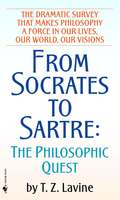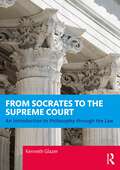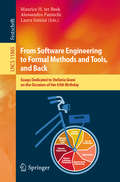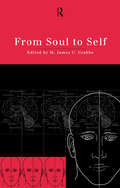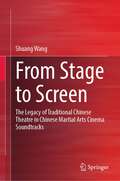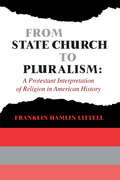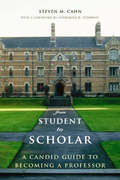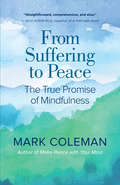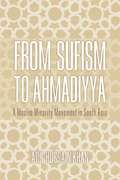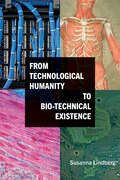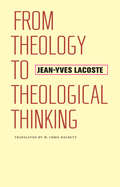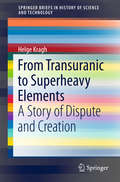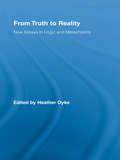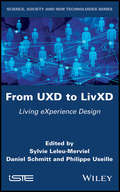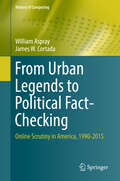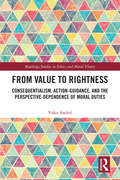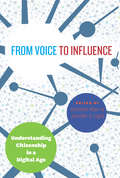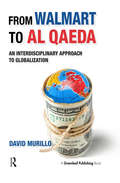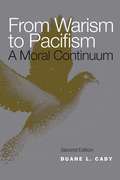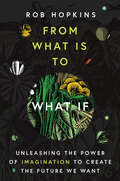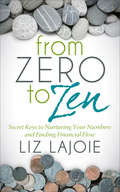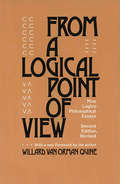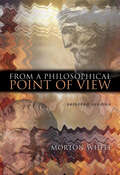- Table View
- List View
From Socrates to Sartre: The Philosophic Quest
by T. Z. LavineA challenging new look at the great thinkers whose ides have shaped our civilizationFrom Socrates to Sartre presents a rousing and readable introduction to the lives, and times of the great philosophers. This thought-provoking book takes us from the inception of Western society in Plato's Athens to today when the commanding power of Marxism has captured one third of the world. T. Z. Lavine, Elton Professor of Philosophy at George Washington University, makes philosophy come alive with astonishing clarity to give us a deeper, more meaningful understanding of ourselves and our times.From Socrates to Sartre discusses Western philosophers in terms of the historical and intellectual environment which influenced them, and it connects their lasting ideas to the public and private choices we face in America today.From Socrates to Sartre formed the basis of from the PBS television series of the same name.From the Paperback edition.
From Socrates to the Supreme Court: An Introduction to Philosophy through the Law
by Kenneth GlazerPhilosophy and law are separate disciplines, but they deal with many of the same issues—from the meaning of equality and liberty, the nature of knowledge, reasoning, and mental states, to the indeterminacy of language, causation, free will, luck, and personal identity. This textbook introduces philosophy to undergraduates in a new and refreshing way—by using cases, concepts, and doctrines from the law to illustrate philosophical issues. From Socrates to the Supreme Court: An Introduction to Philosophy through the Law introduces the major areas in the discipline—moral and political philosophy, epistemology, metaphysics, philosophy of mind and language—and philosophy’s great thinkers, from Plato, Aristotle, Hume, and Kant to Russell, Wittgenstein, Austin, and Anscombe. It shows how ideas in philosophy are not academic but play out in Supreme Court rulings and other court cases. Through example after example—the concept of mens rea in criminal law, the rules governing the admissibility of evidence in court, statutory interpretation, free speech, perjury, the analogical nature of legal reasoning, the use of the Socratic method in deciding cases, and the laws against discrimination—this book deepens the student’s understanding of philosophy by driving home the fact that philosophical questions matter in the real world.
From Software Engineering to Formal Methods and Tools, and Back: Essays Dedicated to Stefania Gnesi on the Occasion of Her 65th Birthday (Lecture Notes in Computer Science #11865)
by Alessandro Fantechi Maurice H. ter Beek Laura SeminiThis volume was published in honor of Stefania Gnesi’s 65th birthday. The Festschrift volume contains 32 papers written by close collaborators and friends of Stefania and was presented to her on October 8, 2019 one-day colloquium held in Porto, Portugal, The Festschrift consists of eight sections, seven of which reflect the main research areas to which Stefania has contributed. Following a survey of Stefania's legacy in research and a homage by her thesis supervisor, these seven sections are ordered according to Stefania's life cycle in research, from software engineering to formal methods and tools, and back: Software Engineering; Formal Methods and Tools; Requirements Engineering; Natural Language Processing; Software Product Lines; Formal Verification; and Applications.
From Soul to Self
by M. James C. CrabbeFrom Soul to Self takes the reader on a fascinating journey through philosophy, theology, religious studies, and physiological sciences. Each of the essays, drawn from a number of different fields, focuses on the idea of the soul and of our sense of ourselves.A stellar line-up of authors explore the relationship between a variety of ideas that have arisen in philosophy, religion and science, each idea seeking to explain why we think that we as individuals are somehow distinct and unique.Contributors: Richard Sorabji, Anthony Kenny, Kallistos Ware, Peter Riviere, Gary Matthews, Susan Greenfield, Galen Strawson
From Stage to Screen: The Legacy of Traditional Chinese Theatre in Chinese Martial Arts Cinema Soundtracks
by Shuang WangChinese martial arts cinema is held to be a synthesis drawing on artistic conventions of traditional Chinese theatre. Film sound and music perform as the legitimate heirs of some of the aesthetic ideas and norms of traditional Chinese theatre. This book critically examines the history of this under-explored field of inquiry from a theoretically comparative perspective, demonstrating that the musical codes drawn from traditional theatre are a constantly changing component integral to Chinese martial arts cinema. It explores the interaction between traditional Chinese theatre and Chinese martial arts cinema in how the musical codes of the former have shaped the aesthetics of the latter uniquely. This departs from conventional existing studies that focus on “adaptation.” The book’s historical and theoretical approach connects film, theatre and music, and re-defines the status of distinctive domains of filmic expression, grounding theatre as the pivot – or “hinge” – of film aesthetics. The book proffers this unique angle of research to rethink and re-imagine film sound and audiovisual synchronisation. Primarily intended for scholars in Chinese cinema, film music, Chinese theatre and visual culture, this monograph also presents introductory and comprehensive material for undergraduate and graduate-level courses in film and media studies, film music, Chinese cinema, and Chinese theatre.
From State Church to Pluralism: A Protestant Interpretation of Religion in American History
by Franklin LittellFor most of our history, American religious life has been dominated by a view of church history in which we appear as mere deposits of European religious culture. In fact, however, the freedom of Americans to choose without penalty to join any religious body or none at all is new in human history. This book is an effort to understand and interpret how we arrived at our present situation and, in doing so, to clarify many cultural, social and political issues.
From Stoicism to Platonism
by Engberg-Pedersen TroelsFrom Stoicism to Platonism describes the change in philosophy from around 100 BCE, when monistic Stoicism was the strongest dogmatic school in philosophy, to around 100 CE, when dualistic Platonism began to gain the upper hand - with huge consequences for all later Western philosophy and for Christianity. It is distinguished by querying traditional categories like 'eclecticism' and 'harmonization' as means of describing the period. Instead, it highlights different strategies of 'appropriation' of one school's doctrines by philosophers from the other school, with all philosophers being highly conscious of their own identity. The book also sets out to break down the traditional boundaries between, on the one hand, the study of Greco-Roman philosophy in the period and, on the other hand, that of contemporary Hellenistic Jewish and early Christian writings with a philosophical profile. In these ways, the book opens up an immensely fruitful period in the history of philosophy.
From Student to Scholar
by Steven M. Cahn Catharine R. StimpsonSteven M. Cahn's advice on the professorial life covers an extensive range of critical issues: how to plan, complete, and defend a dissertation; how to navigate a job interview; how to improve teaching performance; how to prepare and publish research; how to develop a professional network; and how to garner support for tenure. He deals with such hurdles as a difficult dissertation advisor, problematic colleagues, and the pressures of the tenure clock. Whether you are beginning graduate study, hoping to secure an academic position, or striving to build a professorial career, Cahn's insights are invaluable to traversing the thickets of academia.
From Suffering to Peace: The True Promise of Mindfulness
by Mark ColemanLike yoga before it, mindfulness is now flourishing in every sector of society. It is a buzzword in everything from medicine to the military. Mark Coleman, who has studied and taught mindfulness meditation for decades, draws on his knowledge to not only clarify what mindfulness truly means but also reveal the depth and potential of this ancient discipline. Weaving together contemporary applications with practices in use for millennia, his approach empowers us to engage with and transform the inevitable stress and pain of life, so we can discover genuine peace — in the body, heart, mind, and wider world. While profound and multilayered, the mindfulness teachings Coleman shares have proved effective in a wide variety of settings. From Suffering to Peace will help readers of all kinds access and benefit from the “true promise of mindfulness.”
From Sufism to Ahmadiyya
by Adil Hussain KhanThe Ahmadiyya Muslim community represents the followers of Mirza Ghulam Ahmad (1835-1908), a charismatic leader whose claims of spiritual authority brought him into conflict with most other Muslim leaders of the time. The controversial movement originated in rural India in the latter part of the 19th century and is best known for challenging current conceptions of Islamic orthodoxy. Despite missionary success and expansion throughout the world, particularly in Western Europe, North America, and parts of Africa, Ahmadis have effectively been banned from Pakistan. Adil Hussain Khan traces the origins of Ahmadi Islam from a small Sufi-style brotherhood to a major transnational organization, which many Muslims believe to be beyond the pale of Islam.
From Technological Humanity to Bio-technical Existence (SUNY series, Intersections: Philosophy and Critical Theory)
by Susanna LindbergFrom Technological Humanity to Bio-technical Existence can be framed as a metaphysics of the present. It starts from the current epoch, an era increasingly marked not only by technology but also by technics in the most general sense, and asks how this affects human existence. The book asks what is called technics, what is called humanity, how these relate to one another, and how changes in these notions oblige us to revise the philosophical notion of existence. It investigates how the idea of technological humanity—of technology as an extension and instrument of the human—is discovered and deconstructed by Martin Heidegger, Helmuth Plessner, Michel Foucault, Jacques Derrida, Bernard Stiegler, and Giorgio Agamben. Finally, the book presents a new idea of bio-technical existence, one that underlies these philosophers' works without being fully elaborated. This idea—of technics as a condition of humanity that humans share with other living and technical beings—is the author's own philosophical proposition and the final result of the book.
From Theology to Theological Thinking (Richard Lectures)
by Jeffrey Bloechl Jean-Yves Lacoste W. Chris Hackett"Christian philosophy" is commonly regarded as an oxymoron, philosophy being thought incompatible with the assumptions and conclusions required by religious faith. According to this way of thinking, philosophy and theology must forever remain distinct.In From Theology to Theological Thinking, Jean-Yves Lacoste takes a different approach. Stepping back from contemporary philosophical concerns, Lacoste--a leading figure in the philosophy of religion--looks at the relationship between philosophy and theology from the standpoint of the history of ideas. He notes in particular that theology and philosophy were not considered separate realms until the high Middle Ages, this distinction being a hallmark of the modern era that is coming to an end. Lacoste argues that the intellectual task before us now is to work in the frontier region between or beyond these domains, work he identifies as "the task of thinking." With this argument, Lacoste resets our understanding of Western Christian thought, contending that a new way of thinking that is at once philosophical and theological will be the lasting discourse of Christianity.
From Transuranic to Superheavy Elements
by Helge KraghThe story of superheavy elements - those at the very end of the periodic table - is not well known outside the community of heavy-ion physicists and nuclear chemists. But it is a most interesting story which deserves to be known also to historians, philosophers, and sociologists of science and indeed to the general public. This is what the present work aims at. It tells the story or rather parts of the story, of how physicists and chemists created elements heavier than uranium or searched for them in nature. And it does so with an emphasis on the frequent discovery and naming disputes concerning the synthesis of very heavy elements. Moreover, it calls attention to the criteria which scientists have adopted for what it means to have discovered a new element. In this branch of modern science it may be more appropriate to speak of creation instead of discovery. The work will be of interest to scientists as well as to scholars studying modern science from a meta-perspective.
From Truth to Reality: New Essays in Logic and Metaphysics
by Heather DykeQuestions about truth and questions about reality are intimately connected. One can ask whether numbers exist by asking "Are there numbers?" But one can also ask what arguably amounts to the same question by asking "Is the sentence 'There are numbers' true?" Such semantic ascent implies that reality can be investigated by investigating our true sentences. This line of thought was dominant in twentieth century philosophy, but is now beginning to be called into question. In From Truth to Reality, Heather Dyke brings together some of the foremost metaphysicians to examine approaches to truth, reality, and the connections between the two. This collection features new and previously unpublished material by JC Beall, Mark Colyvan, Michael Devitt, John Heil, Frank Jackson, Fred Kroon, D. H. Mellor, Luca Moretti, Alan Musgrave, Robert Nola, J. J. C. Smart, Paul Snowdon, and Daniel Stoljar.
From UXD to LivXD: Living eXperience Design
by Daniel Schmitt Sylvie Leleu-Merviel Philippe UseilleLiving eXperience Design – the design of life experiences – is an extension of user experience design (UXD). The context comprises usage and practice in real contexts in which spatial, urban, social, temporal, historical and legal dimensions are considered. Reflecting upon LivXD is to examine the whole experience of a target audience in a variety of situations – and not only in those involving digital technology. This book begins with the definition of LivXD and its associated epistemology, and proceeds to detail field experiments in certain privileged areas: the relation to creation and works, mediation and adult education.
From Urban Legends to Political Fact-Checking: Online Scrutiny in America, 1990-2015 (History of Computing)
by William Aspray James W. CortadaThis text presents an historical examination of political fact-checking, highlighting how this is part of a larger phenomenon of online scrutiny that manifests itself in multiple forms. Reflecting the long history of “fake facts” in America, the book discusses important developments in this area from the emergence of the public Internet in the 1990s to the start of the Trump-Clinton presidential election campaigns.Topics and features: describes how some of the major players in political fact-checking began with the purpose of scrutinizing and debunking of urban legends; considers how this was part of a wider culture, encompassing B-grade horror movies, truth-or-fiction television shows, and groups warning about computer viruses; explains how such developments are connected, revealing political fact-checking as one of many forms of scrutiny applied in the face of a complex, dangerous world; provides a range of detailed case studies, covering such topics as the rumors surrounding the 9/11 terrorist attacks, and academic interest in contemporary legends; discusses how pre-Internet technologies such as bulletin boards, Usenet, and proprietary online service providers such as CompuServe and AOL were used to both disseminate and debunk urban legends; examines the rise of political fact-checking, reviewing all of the major initiatives in this area undertaken in the United States.This timely study touches on issues of popular culture and major events, and offers profiles of colorful individuals and organizations, and as such will appeal to a broad audience interested in the history of fact-checking and efforts to protect the political process from falsehoods.
From Value to Rightness: Consequentialism, Action-Guidance, and the Perspective-Dependence of Moral Duties (Routledge Studies in Ethics and Moral Theory)
by Vuko AndrićThis book develops an original version of act-consequentialism. It argues that act-consequentialists should adopt a subjective criterion of rightness. The book develops new arguments which strongly suggest that, according to the best version of act-consequentialism, the rightness of actions depends on expected rather than actual value. Its findings go beyond the debate about consequentialism and touch on important debates in normative ethics and metaethics. The distinction between criterion of rightness and decision procedures addresses how, why, and in which sense moral theories must be implemented by ordinary persons. The discussion of the rationales of "ought" implies "can" leads to the discovery of a hitherto overlooked moral principle, "ought" implies "evidence", which can be used to show that most prominent moral theories are false. Finally, in the context of discussing cases that are supposed to reveal intuitions that favour either objective or subjective consequentialism, the book argues that which cases are relevant for the discussion of objectivism and subjectivism depends on the type of moral theory we are concerned with (consequentialism, Kantianism, virtue ethics, etc.). From Value to Rightness will be of interest to scholars and advanced students working in normative ethics and metaethics.
From Voice to Influence: Understanding Citizenship in a Digital Age
by Jennifer S. Light Danielle Allen and Jennifer S. LightHow have online protests—like the recent outrage over the Komen Foundation’s decision to defund Planned Parenthood—changed the nature of political action? How do Facebook and other popular social media platforms shape the conversation around current political issues? The ways in which we gather information about current events and communicate it with others have been transformed by the rapid rise of digital media. The political is no longer confined to the institutional and electoral arenas, and that has profound implications for how we understand citizenship and political participation. With From Voice to Influence, Danielle Allen and Jennifer S. Light have brought together a stellar group of political and social theorists, social scientists, and media analysts to explore this transformation. Threading through the contributions is the notion of egalitarian participatory democracy, and among the topics discussed are immigration rights activism, the participatory potential of hip hop culture, and the porous boundary between public and private space on social media. The opportunities presented for political efficacy through digital media to people who otherwise might not be easily heard also raise a host of questions about how to define “good participation:” Does the ease with which one can now participate in online petitions or conversations about current events seduce some away from serious civic activities into “slacktivism?” Drawing on a diverse body of theory, from Hannah Arendt to Anthony Appiah, From Voice to Influence offers a range of distinctive visions for a political ethics to guide citizens in a digitally connected world.
From Walmart to Al Qaeda: An Interdisciplinary Approach to Globalization
by David MurilloFrom Walmart to Al Qaeda explains the fuzzy, complex and seemingly incomprehensible concept of globalization. What is globalization? What are the core topics, theories and competing ideologies? Are we walking towards homogenization or towards a global collision of cultures and identities? The potential risks and challenges for the global economy, corporations and political regimes are acknowledged by most but not fully understood. This book provides a refreshing new look at how society is being shaped by globalization and how these apparent destructive patterns can be both explained and potentially remedied.Globalization is both a concept and a cliché. It is a term that is used to explain an economic system or the state of the world. David Murillo sets out the questions and identifies the interrelationships of different disciplines to both understand the issues and also find solutions. The book discusses globalization and current attempts to conceptualize and measure it. There are theoretical and ideological debates on whether globalization is inevitable and the various alternatives for interpreting how the world works.Accompanying Teaching Notes are available on request with the purchase of this book.
From Warism to Pacifism: A Moral Continuum
by Cady Duane L.Duane Cady views warism and pacifism as polar extremes on a continuum that embraces a full spectrum of ethical positions on the morality of war and peace. Realizing that he could not intellectually defend the notions of just-war theory, he found that he was a reluctant pacifist. In this new edition of From Warism to Pacifism, Cady continues to expose the pervasive, subconscious warism that is the dominant ideology in modern Western culture. He explores the changes over the last twenty years—from the end of the Cold War to the ongoing “war on terror,” as well as Barack Obama winning the Nobel Prize for Peace. Like racism and sexism, the uncritical presumption that war is morally justifiable, even morally required, misguides our attitudes and institutions. In its place, Cady proposes the development of a positive concept of peace. Citing common objections to pacifist values, he describes peace as something more than the mere absence of war and demonstrates that pacifism is a defensible position.
From What Is to What If: Unleashing the Power of Imagination to Create the Future We Want
by Rob Hopkins&“Big ideas that just might save the world&”—The GuardianThe founder of the international Transition Towns movement asks why true creative, positive thinking is in decline, asserts that it's more important now than ever, and suggests ways our communities can revive and reclaim it.In these times of deep division and deeper despair, if there is a consensus about anything in the world, it is that the future is going to be awful. There is an epidemic of loneliness, an epidemic of anxiety, a mental health crisis of vast proportions, especially among young people. There&’s a rise in extremist movements and governments. Catastrophic climate change. Biodiversity loss. Food insecurity. The fracturing of ecosystems and communities beyond, it seems, repair. The future—to say nothing of the present—looks grim.But as Transition movement cofounder Rob Hopkins tells us, there is plenty of evidence that things can change, and cultures can change, rapidly, dramatically, and unexpectedly—for the better. He has seen it happen around the world and in his own town of Totnes, England, where the community is becoming its own housing developer, energy company, enterprise incubator, and local food network—with cascading benefits to the community that extend far beyond the projects themselves.We do have the capability to effect dramatic change, Hopkins argues, but we&’re failing because we&’ve largely allowed our most critical tool to languish: human imagination. As defined by social reformer John Dewey, imagination is the ability to look at things as if they could be otherwise. The ability, that is, to ask What if? And if there was ever a time when we needed that ability, it is now.Imagination is central to empathy, to creating better lives, to envisioning and then enacting a positive future. Yet imagination is also demonstrably in decline at precisely the moment when we need it most. In this passionate exploration, Hopkins asks why imagination is in decline, and what we must do to revive and reclaim it. Once we do, there is no end to what we might accomplish.From What Is to What If is a call to action to reclaim and unleash our collective imagination, told through the stories of individuals and communities around the world who are doing it now, as we speak, and witnessing often rapid and dramatic change for the better.
From Zero to Zen: Secret Keys to Nurturing Your Numbers and Finding Financial Flow
by Liz LajoieAre you frustrated with your finances and ready for a painless solution? Is your coaching or creative business ramping up, but your bookkeeping gets you down? Do you cringe when you have to deal with your finances, and wish it could just be easy? From Zero to Zen shows you how to manage your money so your business is fabulously successful. When you dig into your books and learn exactly what to do and when, you&’ll take your business to a whole new level.This book is for motivated coaches and creative professionals who want to help people and make money.
From a Logical Point of View: Nine Logico-Philosophical Essays
by W. V. QuineThese nine essays are largely concerned with the theory of meaning and references—semantics. At the same time adjacent portions of philosophy and logic are discussed. To the existence of what objects may a given scientific theory be said to be committed? And what considerations may suitably guide us in accepting or revising such ontological commitments? These are among the questions dealt with in this book, particular attention being devoted to the role of abstract entities in mathematics. There is speculation on the mechanism whereby objects of one sort or another come to be posited a process in which the notion of identity plays an important part.
From a Philosophical Point of View: Selected Studies
by Morton WhiteOne of the most important philosophers of recent times, Morton White has spent a career building bridges among the increasingly fragmented worlds of the humanities, social sciences, and natural sciences. From a Philosophical Point of View is a selection of White's best essays, written over a period of more than sixty years. Together these selections represent the belief that philosophers should reflect not only on mathematics and science but also on other aspects of culture, such as religion, art, history, law, education, and morality. White's essays cover the full range of his interests: studies in ethics, the theory of knowledge, and metaphysics as well as in the philosophy of culture, the history of pragmatism, and allied currents in social, political, and legal thought. The book also includes pieces on philosophers who have influenced White at different stages of his career, among them William James, John Dewey, G. E. Moore, and W. V. Quine. Throughout, White argues from a holistic standpoint against a sharp epistemological distinction between logical and physical beliefs and also against an equally sharp one between descriptive and normative beliefs. White maintains that once the philosopher abandons the dogma that the logical analysis of mathematics and physics is the essence of his subject, he frees himself to resume his traditional role as a student of the central institutions of civilization. Philosophers should function not merely as spectators of all time and existence, he argues, but as empirically minded students of culture who try to use some of their ideas for the benefit of society.
From the American Civil War to the War on Terror
by Emily HartzThis book offers a systematic and comprehensive account of the key cases that have come to shape the jurisprudence on emergency law in the United States from the Civil War to the War on Terror. The legal questions raised in these cases concern fundamental constitutional issues such as the status of fundamental rights, the role of the court in times of war, and the question of how to interpret constitutional limitations to executive power. At stake in these difficult legal questions is the issue of how to conceive of the very status of law in liberal democratic states. The questions with which the Supreme Court justices have to grapple in these cases are therefore as philosophical as they are legal. In this book the Court's arguments are systematized according to categories informed by constitutional law as well as classic philosophical discussions of the problem of emergency. On this basis, the book singles out three legal paradigms for interpreting the problem of emergency: the rights model, the extra-legal model and the procedural model. This systematic approach helps the reader develop a philosophical and legal overview of central issues in the jurisprudence on emergency.
